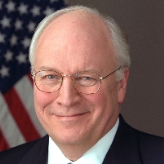Officials
Back to Officials


Offical

Name: Cheney, Dick
Current Position: Previous Vice-President
A native of Lincoln, Nebraska, Richard B. “Dick” Cheney served as Vice President of the United States from January 20, 2001, until January 20, 2009. In this capacity, he served as president of the US Senate.
Cheney attended Yale University from 1959-1960 but did not graduate. He attended Casper College in Wyoming in 1963. He received his BA in 1965 and his MA in 1966 from the University of Wyoming.
Cheney served as a Congressional fellow during 1968-1969, before joining the Nixon administration. He served as special assistant to the director of the Office of Economic Opportunity (1969-1970), White House staff assistant (1971) and assistant director of the Cost of Living Council (1971-1973)
During 1973-1974, Cheney served as vice president of the investment firm of Bradley, Woods & Co.
He then returned to the White House, serving as deputy assistant to President Gerald Ford (1974-1975) and White House chief of staff (1975-1977)
Cheney was elected to the House of Representatives from Wyoming in 1978 and served 10 years in Congress. During his Congressional career, he served as chairman of the Republican Policy Committee, chairman of the House Republican Conference and House Minority Whip.
In 1989, President George H. W. Bush selected Cheney to be secretary of defense. After Bush was defeated in 1992, Cheney became a senior fellow at the American Enterprise Institute (until 1995) and took control of the Halliburton Company as chairman and chief executive office, which he ran until joining the George W. Bush ticket in 2000.
Cheney is considered one of the most powerful vice presidents in US history. He played a significant role in shaping the foreign policy and national security priorities of the Bush administration. He promoted an aggressive posture towards terrorists and those regimes deemed a threat to the United States. Closely aligned with neoconservatives like former Defense Secretary Donald Rumsfeld, Cheney advocated for military action against Afghanistan and Iraq.
One of the “hallmarks” of Cheney’s tenure as vice president was secrecy. He fought to keep his office records from official scrutiny and fended off a number of challenges to get records from his meetings publicly released. A key example was the records of his meetings with energy industry executives that were aimed at helping formulate the Bush administration’s energy policies, which became the focus of a drawn-out lawsuit spearheaded by the conservative group Judicial Watch. The Washington Post wrote of Cheney’s operation in the White House: “Across the board, the vice president’s office goes to unusual lengths to avoid transparency. Cheney declines to disclose the names or even the size of his staff, generally releases no public calendar, and ordered the Secret Service to destroy his visitor logs.”
The Dark Side (PBS Frontline)
Cheney’s ‘Dark Side” is Showing (by Dan Froomkin, Washington Post)
The Curse of Dick Cheney (by T.D. Allman, Rolling Stone)
- Latest News
- D.C. Public Schools will Teach all Second-Graders to Ride a Bike
- New Rule in Germany Limits Sales of Sex-Themed E-Books to 10pm to 6am
- What Happened to the 6-Year-Old Tibetan Boy the Chinese Government Kidnapped 20 Years Ago?
- U.S. Ambassador to Turkey Photoshops his Hair Color to Mock Turkish Mayor
- Mystery Artist Calls Attention to Unfixed Potholes by Drawing Penises around Them




